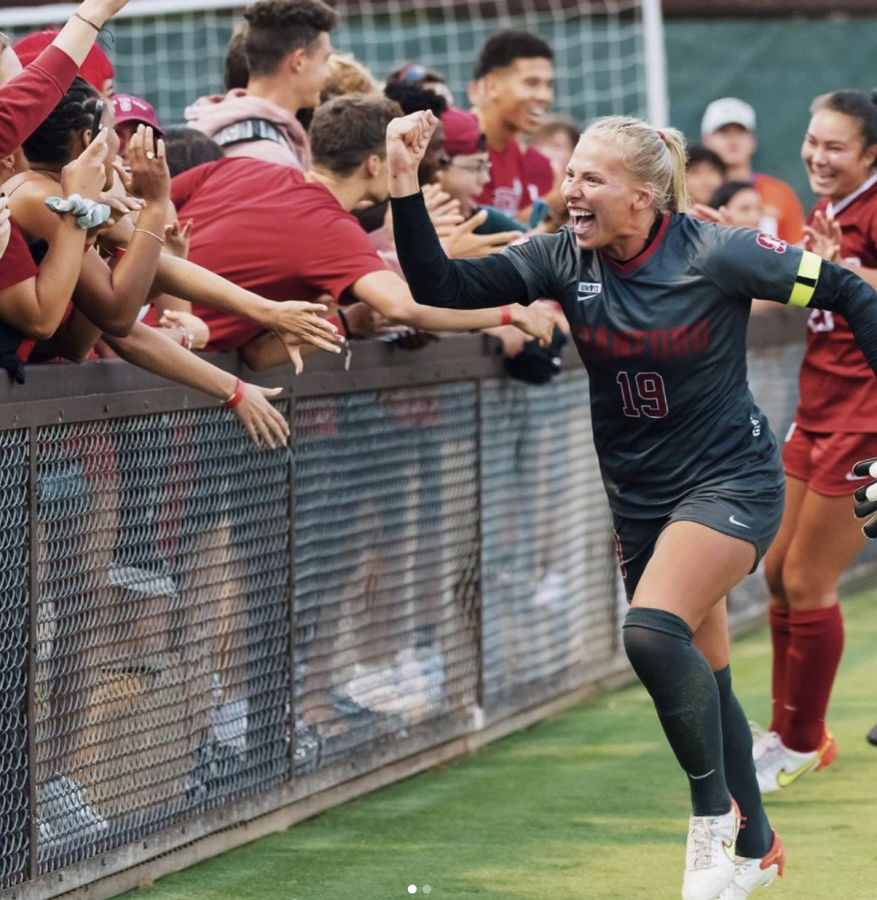Tragedy at Stanford University
Soccer star Katie Meyer’s death and athlete mental health
Stanford University’s women’s soccer goalie and captain, 22 year old Katie Meyer, was found in her dorm room after passing away on March 1.
Trigger Warning:
This article centers around mental health and suicide. If you are struggling, know you aren’t alone and there are people that want to help you. Please consider reading this article with a trusted adult.
Suicide Hotline: 800-273-8255
One week ago, an announcement about an athlete’s suicide shocked the sports world. That athlete was Katie Meyer, the goalie and captain of the Stanford University women’s soccer team. The tragedy of this young woman’s death has raised serious concerns and outrage surrounding the lack of attention towards athletes’ mental health.
Katie Meyer seemed to have it all. She was a student at one of the best universities in the United States, captain of the soccer team, and was living a life that so many athletes dream of. There were not any signs that anything was wrong, nor was anyone looking for them. In an interview with TODAY, Meyer’s parents recalled their last FaceTime call with her which occurred the morning of the day that would change their lives forever. She was happy, excited, and nothing seemed out of the ordinary.
This emotional interview left even the reporter in tears. As Meyer’s mother Gina sat beside her husband, she was asked about the cardinal Stanford crewneck she was wearing. “I know it’s going to sound crazy, but every mom is going to understand this, but when you smell it, it smells like her, it smells like Katie, just her scent.”
Struggling to hold back sobs, the couple explained what they suspect caused Katie’s sudden decision to take her own life. As well as the pressure to always be number one, there had been an event in which Katie had defended her friend over an incident, and as a result was facing disciplinary action. She had just received a letter about the event. Her parents explained, “This letter was kind of the final letter that there was going to be a trial or some kind of something. This is the only thing that we can come up with that triggered something.”
They feel that they missed the opportunity to save Katie because they were unaware of this situation. To ensure no other parents have the same devastation, the Meyers are trying to open up communication between administrators and parents.
Written on March 2, the day after Katie’s death, Stanford came out with an “update on the loss of an undergraduate student.” After offering condolences to the Meyer family and describing the amazing impact Katie had on the soccer team, the update ends with an address to the community. “There are no words to express the emptiness that we feel at this moment…Please know you are not alone…We can all help by checking in on friends and loved ones. Be caring to yourselves and one another. We will grieve this great loss together, and we will be here for each other.”
This tragedy has not only impacted the Stanford community. All athletes at Bishop’s and beyond can understand the pressure that is constantly on an athlete’s shoulders, especially a student athlete. Katie Meyer’s death has been drawing the sports world’s attention to the subject.
Two famous athletes have been calling attention towards this important topic. Naomi Osaka shocked the world when she withdrew from tennis’ 2021 French Open, and Simone Biles followed suit, withdrawing from the Women’s Gymnastics Team Competition at the Tokyo 2020 Olympics. Both called for more respect and acknowledgement for athlete mental health. According to the Associated Press, Biles declared, “We have to protect our mind and our body, rather than just go out there and do what the world wants us to do.”
Just how nobody was aware until these events that Biles and Osaka were struggling with their mental health, nobody knew what Katie Meyer was going through until it was too late. The loss of this incredible athlete has turned the sports world’s head back to this problem and the stigma around talking about it.
Stanford described Katie as a committed, passionate teammate that was “a bright shining light for so many on the field and in our community,” and for that community, it is now too late to save Katie Meyer. In her memory, they are turning their efforts to the only next step: making sure it never happens again.

If you want to have a conversation with Lily, all you have to do is mention the words ‘field hockey’, and she will talk for hours. She is basically...







